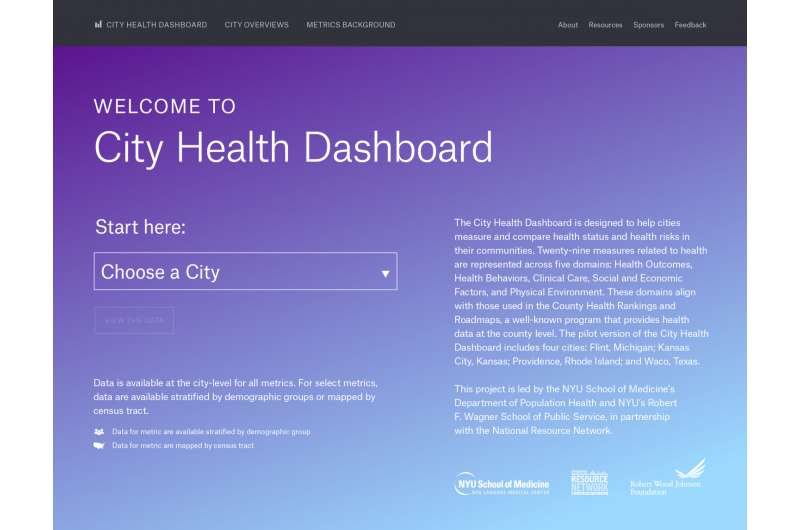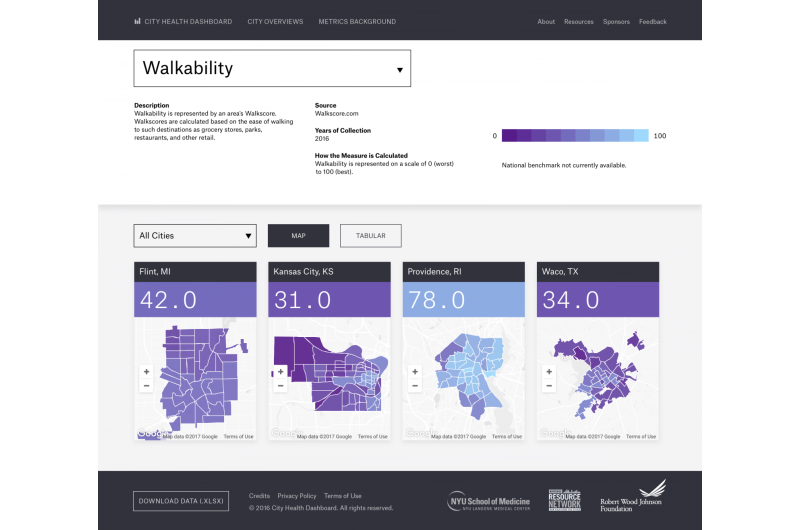Population health resource to give US cities access to key data

Hundreds of United States cities will be able to identify their most pressing health needs more accurately—thanks to a nationwide expansion of the City Health Dashboard, an innovative health data visualization tool.
Created by the Department of Population Health at NYU Langone Medical Center and the Robert F. Wagner School of Public Service at NYU, in partnership with the National Resource Network, the City Health Dashboard launched earlier this year in four cities. It will expand to 500 additional cities over the next two years through a $3.4 million grant from the Robert Wood Johnson Foundation—with the ultimate goal of becoming a central health improvement planning resource for U.S. cities with populations of 70,000 or more, or one-third of the U.S. population.
Users of the City Health Dashboard have the ability to view their city's performance in 26 key measures of health, like obesity and primary care physician coverage; and drivers of health status, such as housing affordability, high school graduation rate, food access, and opioid deaths. For many of the measures, data can be accessed at the neighborhood level.
Marc Gourevitch, MD, MPH, chair of the Department of Population Health at NYU Langone and the program's principal architect, points out that the City Health Dashboard responds to increased interest by cities in data on benchmark measures of health, health determinants, and equity. Currently most data of this scope has only been available at the county level—posing challenges to urban health improvement efforts.
"There is an old adage: 'what gets measured is what gets done," Dr. Gourevitch says. "Community leaders want accurate, actionable, and precise data to advance initiatives that improve health, bring down costs, and focus on community wellbeing. We're excited to be at the vanguard of providing this important information to cities across the country."

How the City Health Dashboard Works
The City Health Dashboard places in the hands of city leaders and community organizations a responsive and highly reliable web interface with regularly refreshed health-related data—overseen by a team of epidemiologists, population health and urban policy experts, and geographic information system specialists.
Data presented by the City Health Dashboard are drawn from federal and state governments and other organizations that apply rigorous methodology to data collection, including the U.S. Census Bureau, the Centers for Disease Control and Prevention, and the Environmental Protection Agency.
"In our work with cities across the nation, we've learned that their governments want to improve the physical health of their residents as well as the fiscal health of their municipalities," says David Eichenthal, executive director of National Resource Network. "Nationally scaling this resource will help place health at the center of local agenda-setting, improve efficiencies, save city-level expenses, and address the need for comparable data at the local level."
The expanded City Health Dashboard will offer enhanced technical support features to cities more actively engaged in data-driven policy-making. All cities will have access to features to compare peer cities and neighborhoods, tools for tracking performance, and resources to deep-dive into more advanced microdata interfacing.
The four pilot cities—Flint, Michigan; Kansas City, Kansas; Providence, Rhode Island; and Waco, Texas—are already incorporating the City Health Dashboard into their efforts to improve health. For example, Prosper Waco, a nonprofit organization, is using the site to help determine its inner city's need for services related to high teen birth rate.
Says Dr. Gourevitch: "We hope the site will serve as a platform for cities to share and gather knowledge to improve outcomes on some of the most pressing health challenges our society faces."
















